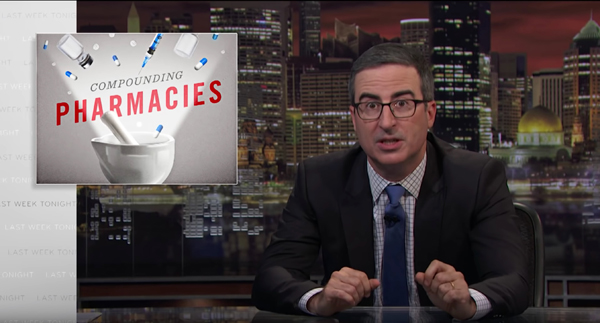The Oliver impact: How to respond when in the crosshairs
The Oliver impact: How to respond when in the crosshairs
- October 25, 2019 |
-
 LORI SHARN BRYANT
LORI SHARN BRYANT

Compounding pharmacies are latest target of HBO host John Oliver

John Oliver, host of Last Week Tonight on HBO, criticized compounding pharmacies during an episode that aired Sept. 29.
Source: Last Week Tonight/YouTube
Scott Bruner was driving from Atlanta to Washington, D.C., when he learned about HBO host John Oliver's monologue the night before criticizing compounding pharmacies.
Brunner, who had become executive vice president of the International Academy of Compounding Pharmacists just seven months earlier, got an email from a board member about 7:15 a.m. on the day after Sept. 29 show. Brunner said he had "not the slightest inkling" the industry takedown was coming.
After turning over the wheel to his wife, Brunner worked with IACP leaders and corporate partners to craft a statement that would strike the right tone: "righteous indignation."
"Members expect you to respond even when you know the response will have limited effect," Brunner said.
Oliver has taken on many industries. In a 2014 show on student debt and for-profit schools, Oliver urged viewers to email the Association of Private Sector Colleges and Universities (now the Career Education Colleges and Universities). He called out the National Chicken Council in a 2016 show blasting poultry processors. Other industries targeted by Oliver include private prisons, medical devices, coal, sugar and telecommunications.
Coming under fire is a challenge but also an opportunity for association CEOs to demonstrate leadership, said Craig Pugh, president of Chicago-based Public Communications Inc. Pugh said it's critical to have a communications plan in place before a crisis, including an assessment of threats, identifying key team members, preparing fact sheets, statements and other templates, and to have a system for monitoring social media.
For associations, the initial audience is internal: "Define the stakeholders who matter most to you—your members, volunteer governance, closest professional partners, the affiliations that matter most," Pugh said. "You're starting with family first to tell your story and help them make sense of it."
IACP has three full-time staffers, including Brunner, and revenue of $1.2 million. He was able to tap communications experts at IACP's wholesaler partners. They held a morning conference call and then did further back and forth on the statement that went out about 3 p.m. (The American Pharmacists Association also put out a statement a day after IACP.)
Brunner's statement said the truth is "considerably more nuanced" than portrayed in Oliver's comedy show, which "strung together old tragic news with cherry-picked examples" of violations. He added that IACP is working to assure that compounding professionals adhere to the highest standards in an environment of robust and appropriate regulation.
Brunner told CEO Update the association got "rave reviews from members for our responsiveness and I think the tone of it."
"We went with righteous indignation because we know there are some problems in the profession. They are a fringe and we've got to deal with them," Brunner said. "We're most annoyed by the fact that he didn't mention the value that compounding provides to millions of patients every day."
